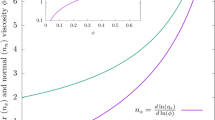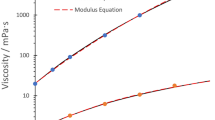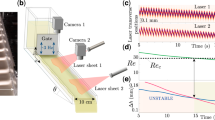Abstract
FRICTION in turbulent flow can be reduced by the addition of small quantities of soluble polymers of high molecular weight. It has been suggested that the effect is connected with non-Newtonian properties of the solutions such as a shear dependent viscosity or viscoelasticity. In solutions of the concentrations which exhibit drag reduction, however, no shear dependence of viscosity has been observed.
This is a preview of subscription content, access via your institution
Access options
Subscribe to this journal
Receive 51 print issues and online access
$199.00 per year
only $3.90 per issue
Buy this article
- Purchase on Springer Link
- Instant access to full article PDF
Prices may be subject to local taxes which are calculated during checkout
Similar content being viewed by others
References
Rubin, M., and Elata, C., Phys. Fluids, 9, 1929 (1966).
Song, C. S., and Tsai, F. Y., Univ. Minnesota, St Anthony Falls Hydraulic Lab. Proj. Rep. No. 84 (1966).
Author information
Authors and Affiliations
Rights and permissions
About this article
Cite this article
BAILEY, B. Behaviour of the Critical Taylor Number in Dilute Polymer Solutions. Nature 222, 373–374 (1969). https://doi.org/10.1038/222373a0
Received:
Revised:
Issue Date:
DOI: https://doi.org/10.1038/222373a0
This article is cited by
-
The scale effect in the laminar flow of dilute solutions of polymers in tubes
Journal of Engineering Physics (1978)
-
On scale-dependent effect in laminar flow of dilute polymer solution in tubes
Rheologica Acta (1978)
-
Hydrodynamically induced crystallization of polymers from solution
Colloid and Polymer Science (1977)
-
Polymer drag reduction in Taylor vortices
Nature (1975)
-
Molecular Model of Drag Reduction by Polymer Solutes
Nature (1970)
Comments
By submitting a comment you agree to abide by our Terms and Community Guidelines. If you find something abusive or that does not comply with our terms or guidelines please flag it as inappropriate.



